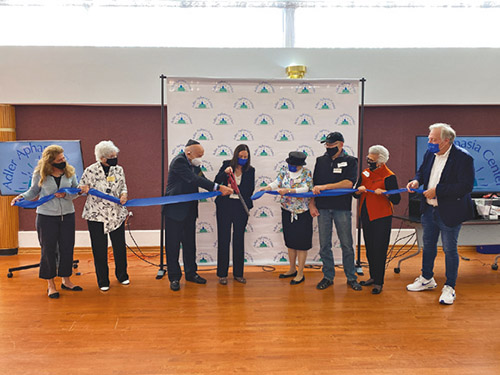



Forty percent of stroke survivors are affected with aphasia, “a language disorder that impairs the expression and understanding of spoken language, reading and writing,” according to literature provided by The Adler Aphasia Center (AAC). Based in Maywood, New Jersey, the AAC has been working to help those suffering from aphasia since 2003. Mike Adler, plagued with aphasia after bypass surgery, and his wife Elaine, founded AAC after unsuccessfully seeking help from around the world. The couple wanted to give others faced with their situation the help they needed to regain communication skills and lead fuller lives.
The AAC focus is “living life,” and members say it is morale-boosting. At the AAC, group treatment teaches new communication skills, helping members regain their confidence, which gives them back their lives. Since opening in Maywood in 2003, the AAC now has a presence in an increasing number of New Jersey counties.
At an open house last week, the AAC’s board of directors showcased the AAC’s expanded Essex County location, B’nai Shalom at 300 Pleasant Valley Way in West Orange. Co-chaired by Jill Tekel and Barbara Drench, the event highlighted the mission of the AAC to offer speech services and support for those recovering from stroke and brain injury. After a meet and greet with the Adler staff and breakfast outdoors under a festive tent, showcasing the arts and crafts of AAC members, with prizes and raffle giveaways, the program moved indoors. In his welcoming address, Chuck Berkowitz, Chairman of the Board of Directors of AAC, lauded the establishment of the AAC by the Adlers. Naomi Gewirtz, President and CEO of AAC, celebrated with the West Orange community the inauguration of the new Center. She noted that AAC has been serving the area for 10 years.
”While aphasia does not affect intellect,” Gewirtz reflected, “it is a language disorder that cannot be seen.”
In 2012, realizing many people living with aphasia couldn’t get the help they needed due to the distance of the closest AAC, the Center expanded to Essex County and Toms River. Tekel expressed gratitude to West Orange and her shul for partnering with the renowned AAC to offer help to expand the vision of the Adlers and AAC to provide services to local members of the aphasia community, their family and friends. Renowned for utilizing the Life Participation Approach to Aphasia to help its members regain their daily life activities, the Center is achieving its goal with the help of various Foundations, a visionary board and members who generously sponsor AAC.
In 2003, AAC began to teach new communication skills and was the first to offer group treatment to communicate. “The organization also provides social opportunities for members to connect, support for caregivers, and community awareness and education.” “Elaine Adler,” Terkel added, “always said they wanted to bring as many people together as possible.” “The members of AAC,” Tekel emphasized, “are our heroes.”
Drench buddied with Pearl, a stroke survivor with aphasia, to make bracelets. Pearl spoke with Drench about her son-in-law Alan Zweibel. Zweibel, the multi-award-winning comedy writer and acclaimed author was the event guest speaker. Keeping with the AAC fun approach to life, Zweibel told some of his early jokes. He talked about his pay of $7 per joke to Catskills comedians and his move to stand-up, where he met Billy Crystal. Four months in, Zweibel met Lorne Michaels, creator of Saturday Night Live, and that was when he got his big break writing for the hit show during its first five years.
After 16 years in California, he told his wife, a production assistant with roots in New Jersey, that it was time to move home. Soon after, his mother-in-law, “Mom Mom” to his three children, had a stroke and became aphasic. The silver-lining was that Pearl, whom he calls his biggest fan, soon found AAC.
“The Center is commendable,” Zweibel added, “for offering a homelike setting with laughter not only to the patients but to family, support people and friends.”
Zweibel, stating that “AAC is doing a mitzvah for members, their families and friends, and in spreading the word of what aphasia is,” said he, “would do anything he could to help get the word out.”
George Giesey, an AAC member, came to the mic boldly recalling the day of his stroke on Thursday, April 5, 2018 when his left carotid artery collapsed. Starting as a chemist, he had three careers before a left-sided stroke left him with aphasia. At Kessler rehab, his outpatient speech therapist recommended AAC. He joined in June 2019. While stating that recovering from a stroke is “like climbing Mt. Everest,” Giesey learned to drive with his left foot. Now working as a contractor, he was the contractor for the new kitchen at B’nai Shalom.
After the announcement of several local West Orange and Livingston officials was the ribbon-cutting ceremony. A short film highlighted members of AAC involved in group activities. One member stated that he very much likes the Center, acknowledging that AAC is keeping him alive.
For more information, visit www.adleraphasiacenter.org. To volunteer, contact Estee Lavitt, M.P.A., Director of Communications.









